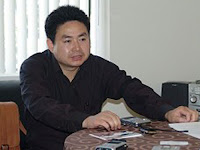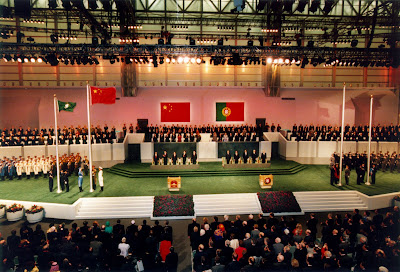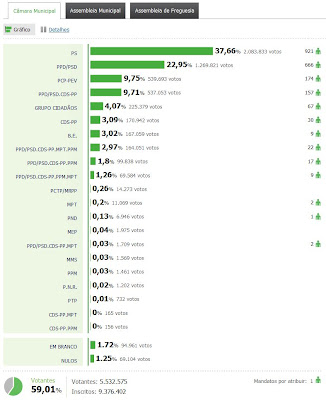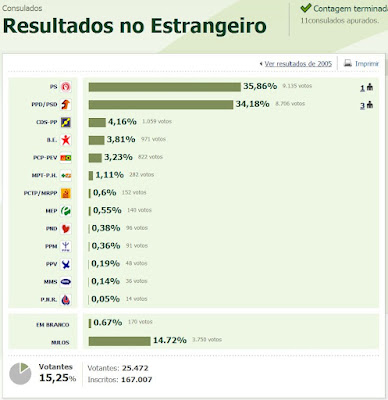 Nuno Lima BastosJornal Tribuna de Macau1 de Outubro de 2010
Nuno Lima BastosJornal Tribuna de Macau1 de Outubro de 2010Agora que já ficaram para trás as eleições legislativas locais e portuguesas, que os votos recontados já tiveram o merecido destino e que o presidente da república já quebrou o tabu das “escutas”, parece-me ser boa altura para, enfim, partilhar com os meus leitores um deplorável incidente a que fui sujeito há três semanas, ou não estivesse ele intimamente associado ao livre exercício do direito de opinião que venho praticando neste espaço desde Fevereiro de 2008.
Como é sabido por quem costuma ler as minhas crónicas, ocupei largo período dos meses de Verão a rever a génese da Fundação Jorge Álvares, em finais de 1999, e as reacções públicas profundamente negativas, aqui e em Portugal, que se seguiram à revelação dessa iniciativa envolvendo o último governador do território. Lateralmente, abordei outros factos contemporâneos desse processo, como a criação do Instituto Internacional de Macau ou os avultados subsídios que o general Rocha Vieira reclamou e recebeu por férias supostamente não gozadas ao longo do seu mandato de quase nove anos.
Tive o cuidado de tudo documentar. Além disso, não recorri ao que eu próprio então escrevera (houve textos meus publicados ou citados no
Ponto Final, no
Diário de Notícias e no
Público, por exemplo), para não cair no duplo papel de fonte e autor. Preferi, ao invés, recorrer à investigação, à narração e à opinião de terceiros que considerei fontes credíveis – profissionais da informação que, ainda hoje, são respeitados no seu meio. Citei algumas posições contrárias, mas em bastante menor escala, por uma razão que julgo (ou julgava...) óbvia: porque, na minha óptica, não apresentavam dados susceptíveis de desmentir os factos que iam caindo no domínio público, antes se ficando por valorações puramente subjectivas de sinal contrário. Nas raras vezes em que o conseguiram fazer, curei de o referir ou, pura e simplesmente, nem sequer fiz uso dos elementos objectivamente refutados.
Tenho, pois, a consciência descansada em relação ao trabalho que levei a cabo ao longo de onze semanas (entre 18 de Junho e 3 de Setembro). O que não tenho, nem pouco mais ou menos, é a pretensão de que toda a gente concorde comigo, muito menos os “visados” nos meus textos (embora a minha preocupação seja denunciar factos; não entrar em ataques pessoais). O mundo é mesmo assim...
O que me traz hoje, então, de volta a este assunto? “Apenas” isto: há, exactamente, três semanas, no final de uma mesa-redonda como tantas outras que costumam ter lugar no território, uma das figuras citadas no conjunto de artigos a que chamei de «antologia da transparência» veio falar comigo. Manifestou-me a sua insatisfação pela minha iniciativa, queixando-se de «falsas» acusações. Recordei-lhe que identificara todas as fontes e sugeri-lhe que redigisse a sua própria versão dos acontecimentos – um direito que lhe assistia e que poderia exercitar com facilidade, ou não beneficiasse de exposição semanal neste mesmo matutino. Depois, os leitores que tirassem as suas conclusões.
A conversa prosseguiu em tom civilizado por mais alguns minutos, até que expressei a minha incompreensão por determinadas palavras que o general Rocha Vieira proferira sobre a Fundação Jorge Álvares em Junho último, no retorno a Macau. Basicamente, e citando agora o
Hoje Macau de 15 desse mês, por ter afirmado que «cumpri o meu dever e nunca deixei de dormir por causa da fundação. Não acredito que haja fundações com maior transparência que esta». Perturbava-me a incapacidade do ex-governador em esboçar um
mea culpa, por muito tímido que fosse.
O meu interlocutor começou a exaltar-se. Retorquiu-me com um repetido «nem tinha que fazer», insistindo que o general fizera tudo bem. Perante isso, deixei claro que nada tinha a alterar na minha «antologia», pois ela traduzia a minha convicção dos factos.
Qual a minha estupefacção quando, em tom assaz agressivo, e não obstante se encontrar já outra pessoa connosco, me dirige estas palavras: «sabe o que eu tive vontade de fazer quando li aqueles artigos pela primeira vez? Tive vontade de lhe partir a cara. Eu devia era partir-lhe esses dentes todos. Sabe o que você é? Um filho-da-puta! Um filho-da-puta, é o que você é!». Posto isto, virou-me, de imediato, as costas e meteu-se num elevador com outras pessoas que passavam no momento.
É verdade que o autor de tão ignóbil atitude foi o mesmo que, numa entrevista à TDM em 4 de Março de 2000, lançou esta despudorada ameaça a destinatários incertos: «quero deixar também este alerta: que estejam atentos também a isso, porque quem não tem o mesmo interesse que todos nós em relação ao futuro de Macau merece ser isolado. Tenho que dizer isto com muita franqueza e muita convicção. Merece ser isolado, ser bem identificado. E se não quiser, se não se sentir bem aqui, olhe, há muitos sítios onde pode estar» (reproduzida no
Ponto Final de 12 de Maio de 2000).
Essa não é, porém, a minha linguagem, nem a minha forma de dirimir diferenças. Por isso, apresentei a competente queixa-crime na justiça.
Um bom amigo lembrava-me, um dia destes, que é nas situações limite que se conhecem as pessoas. Ora aqui está uma dessas situações. Cada um dos vários envolvidos terá a sua responsabilidade a cumprir na realização da justiça. Aguardo serenamente os desenvolvimentos.
E não, ainda não foi desta que me calaram...
Nota: agradeço penhoradamente todas as mensagens de apoio que tenho recebido sobre este assunto, assim como
esta referência publicada no conhecido
Bairro do Oriente (relembrada
aqui e
aqui).
Julgo que, mais do que um acto isolado, está aqui, de certo modo, em causa a salvaguarda de todos aqueles que manifestam publicamente as suas opiniões "não alinhadas" na nossa comunicação social e na blogosfera. Infelizmente, parece haver tiques do passado que ainda não verteram completamente para o esgoto da história, ajudando a empestar o ar que nos rodeia, já de si a braços com outras fontes de poluição mais recentes...
 Público
Público.jpg)

.jpg)
.jpg)

.jpg)
.gif)







.jpg)
.jpg)







.jpg)
.jpg)
.jpg)








.jpg)

















